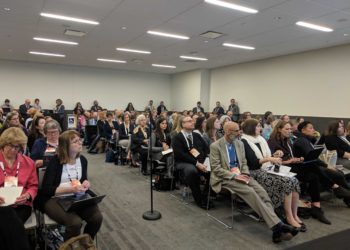It’s conference season in scholarly communications. Between them, the Scholarly Kitchen Chefs have been / will be at 9 events around the world in the 6 week stretch from early April to mid May. In a series of “Smorgasbord” posts, Chefs will share some of the key themes emerging for our sector. This week: Charlie Rapple reports from EARMA (European Association of Research Managers and Administrators), Roy Kaufman from the London Book Fair, and David Crotty from the STM Spring Meeting.

Reforming research assessment
Charlie Rapple
The latest new initiatives in Europe are: the Coalition for Advancing Research Assessment (CoARA) — approx 250 universities have signed up to its commitments, primary among which are to:
-
- Recognize the diversity of contributions to, and careers in, research in accordance with the needs and nature of the research
- Base research assessment primarily on qualitative evaluation for which peer review is central, supported by responsible use of quantitative indicators
- Abandon inappropriate uses in research assessment of journal- and publication-based metrics, in particular inappropriate uses of Journal Impact Factor (JIF) and h-index
- Avoid the use of rankings of research organisations in research assessment
And the SCOPE framework, a five-stage process for evaluating research responsibly:
-
- START with what you value
- CONTEXT considerations
- OPTIONS for evaluating
- PROBE deeply
- EVALUATE your evaluation
Why does this matter? Not that we need convincing, but Science Europe’s Secretary General Lidia Borrell-Damián humanized the challenge: “The system is full of researchers who have stopped doing research because they don’t like the metrics by which they are evaluated. CoARA is more inclusive; it opens the door for example, for women to have maternity leave and not publish but not be disadvantaged.”
Professionalizing research management
EARMA among others lobbied hard for the 2020-2024 iteration of the European Research Agenda (ERA) to include a clause on “strengthening strategic capacity”. The resulting Action 17 is basically about improving / professionalizing / certifying skills in the area of research management. EARMA’s Managing Director Nik Claesen did an audience poll at the conference — “Do you think your organization would support the idea of more money for research management if it means less money for research?” which of course got an 84% “NO” vote (9% yes, 7% I don’t know). He followed that, though, with the persuasive point:
“The key resource in research is not money but the time of researchers. More efficient research management allows more time for research to be done.”
Public engagement and citizen science
“Public engagement is a competitive advantage. In the not-so-good old days, public engagement was just an add-on. People came to us post-award expecting us to deliver engagement for free. But you need to plan the budget and include it in your proposal – weave it into the fabric of the research from the ideation stage. Public engagement is a competitive advantage.”
Hear hear.
Sustainability, Sustainability, Sustainability
Roy Kaufman
This year’s London Book Fair had an increased focus on sustainability issues — from the high flying to the mundane.
One of the highlights of the fair was a visit by London’s celebrity mayor Sadiq Khan, who came to promote sustainability and, of course, his upcoming book Breathe: Tackling the Climate Emergency.
The Fair had a new “Sustainability Lounge,” which was opened by Sherri Aldis, Director, United Nations Regional Information Centre for Western Europe, United Nations and Gareth Rapley, Director, London Book Fair. The lounge hosted three days of well attended talks.
As publishers, librarians and adjacents, we have a dual role. First, we need to ensure that good climate science is created, consumed, available and understood. As discussed in a panel led by Springer Nature’s Nicola Jones, perhaps the biggest impact publishers can have on the sustainable development goals and the climate conversation is to enable the facts of climate research and climate action to reach the public. This will help readers to distinguish fact from fiction.
Second, we need to review our own practices to determine how our own travel, business processes and habits can be changed as we move towards the net zero goals of the 2050 Paris Accords. For example, the panel entitled “Book Fairs: How Sustainable Are They Really?” asked that we consider how we balance the positive environmental impacts (many meetings in one place) with the negatives (travel, materials, energy consumption).
While the London Book Fair home in Olympia may run on fully renewable energy, there is a long way to go. To borrow a quote from Rachel Martin, Elsevier’s Global Director of Sustainability, “nobody gets to net zero by themselves. We all have work to do, not just on climate action, but on every aspect of sustainable development. The key is about working together and in the end that is what SDG 17 is all about, the partnerships that will bring about real action.”
Mainstreaming
David Crotty
After last year’s cancellation, it was great to be back at a Spring STM Annual Meeting in Washington, DC. I’m clearly not the only one who was enthusiastic about its return, as the meeting completely sold out, which as far as I know had never happened before. The program focused a lot on community action, which makes sense as STM continues its transformation to an organization focused on finding solutions where coming together collectively is more effective than each member inventing their own wheel. Sessions on research integrity and supporting open data requirements were particularly informative, although I think my favorite quote of the meeting came from Digital Science’s Shannon O’Reilly, who noted in regard to Altmetrics that, “Elon Musk is ruining my life.”
But I wanted to focus on some data on the changing nature of open access (OA) as it becomes more mainstreamed into the way research is published. As readers of The Scholarly Kitchen should have learned many years ago, claims that OA publishing offers a “citation advantage” (the OACA is basically the notion that OA articles automatically get cited more than subscription articles, suggesting one can buy citations by paying an article processing charge [APC]) are specious, and largely a result of selection bias in observational studies. Because in the journals studied (usually hybrid journals), OA requires paying an APC, those that can afford to do so are more likely to be well-funded labs, which, it turns out, do research that often gets cited more than labs that are unable to secure funding. Also, researchers often save their sparse publication funding for the papers they deem as particularly important, further biasing the sample. When randomized, controlled studies are done to eliminate these biases, the “advantage” goes away.
But newer data presented by Joshua Schnell from Clarivate suggests that while bias remains for hybrid-OA, it is fading fast in fully-OA journals. Schnell looked at Clarivate’s Category Normalized Citation Impact (CNCI), an article-level, rather than a journal-level metric. Citation performance in OA journal articles has continued to decline over recent years toward the level of non-OA articles. But the decline has been much more rapid in fully-OA articles than in hybrid-OA. Much of this is attributed to the strong growth in fully-OA articles being published (growing far faster than hybrid-OA). While this may sound like a negative, to me it is indicative of the normalization of OA. Hybrid-OA, where authors have a choice not to pay, remains the domain of the wealthy that can afford it. But fully-OA seems to have become increasingly democratized and its average level of performance looks more and more like the average level of performance everywhere else. The declining bias is as clear a sign as possible of the mainstreaming of OA publishing.
Discussion
1 Thought on "Smorgasbord: Trends from the Spring 2023 Meetings and Conferences"
David’s the sentence “But fully-OA seems to have become increasingly democratized and its average level of performance looks more and more like the average level of performance everywhere else. The declining bias is as clear a sign as possible of the mainstreaming of OA publishing.”, is not only humorous, but also profound, which is worth thinking about how to balance the OA mode and quality of academic publishing.



